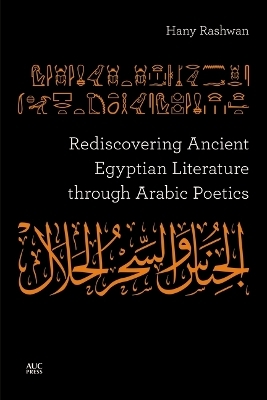
Rediscovering Ancient Egyptian Literature through Arabic Poetics
American University in Cairo Press (Verlag)
978-1-64903-184-6 (ISBN)
- Noch nicht erschienen (ca. September 2025)
- Versandkostenfrei innerhalb Deutschlands
- Auch auf Rechnung
- Verfügbarkeit in der Filiale vor Ort prüfen
- Artikel merken
This book is the first of its kind to thoroughly and systematically compare ancient Egyptian and Arabic literary devices. Hany Rashwan compares the stylistic Arabic literary device of jinās, or word play, a key literary device pervading medieval and modern Arabic poetry, literary prose, songs, and proverbs, with its counterpart in ancient Egyptian. Through the deployment of Arabic literary and critical methods he therefore makes possible the rediscovery of ancient literary register and tone in a way that has eluded Western scholarship. Since Arabic, along with other Semitic languages, such as Hebrew and Akkadian, belongs, like ancient Egyptian, to the Afro-Asiatic linguistic phylum, this vital study also proposes an Arabic-based textual analytic method as a viable comparative critical method for working across these kindred languages.
Rediscovering Ancient Egyptian Literature through Arabic Poetics offers a groundbreaking postcolonial perspective on Egyptological method and theory by challenging the use of Eurocentric literary theories, terms, and concepts, and refreshing the study of ancient Egyptian and Arabic poetics. This innovative approach also speaks to, and challenges, a broader audience, including scholars of comparative poetics, comparative literature, world literature, Arabic poetics, and constructive rhetoric.
Hany Rashwan is assistant professor of Arabic Language and Literature at United Arab Emirates University (UAEU) and an Honorary Research Fellow at the University of Birmingham. He was aresearch fellow of Arabic literary theory at the University of Birmingham,where he led the Arabic poetics strand of the Global Literary Theory project funded by the European Research Council. He previously held an Andrew Mellon Postdoctoral Fellowship at the American University of Beirut. The recipient of an International Society for the History of Rhetoric (ISHR) Research Fellowship, Rashwan earned his PhD in Cultural, Literary, and Postcolonial Studies from the School of Oriental and African Studies (SOAS), University of London. Stephen Quirke is professor of Egyptology at the Institute of Archaeology, University College London. His publications include Going out in Daylight – prt m hrw: The Ancient Egyptian Book of the Dead – translation, sources, meanings (2013). Ayman A. El-Desouky is associate professor of Modern Arabic and Comparative Literature at the Doha Institute for Graduate Studies in Qatar. He is the author of The Intellectual and the People in Egyptian Literature and Culture: Amāra and the 2011 Revolution (2014).
A Note on Dates, Translations, Transliterations, and Comparative Scope
1. Indigenous Egyptologists and Eurocentric Monopoly
Eurocentric AE literary theories
2. The Bible as a Motor of AE Comparisons
Eurocentric comparative disciplines
The Birth of Comparative Balāgha
AE Balāgha and Eurocentric Literary Criticism
3. Jinās through the Lens of Eurocentrism
From Pure Greco-Roman to the Modern Colonial Languages
The Artificial Universality of Eurocentric Literary Terms
The Conceptual Resonance of Arabic Literary Terms
4. Writing versus Language in the AE Culture
The Pictorial Realism of AE Writing
Visual Morphology Generates New Semantics
The Realms of mAA 'to see' in Reading the AE Writing
Aesthetical Calligraphy of AE Scripts
5. Linguistic Classification of the AE Language
AE-Semitic Relationship
Rethinking Phonetics of the AE Writing
6. The Death of AE Writers and Readers
Euro-American scholarship of AE literature
Literariness between Eurocentrism and modernism
The Premodern Concept of Arabic Adab
7. Definition of Balāgha (linguistically and conceptually)
Vocal form (lafẓ) and poetic meaning (maʿnā) in balāgha
AE Literary mdt-kalām
8. Definitions of Jinās within Early Balāgha
Jinās through the Disciplines of Balāgha
Various Types of Arabic Jinās
9. Partial Jinās (الناقص- المختلف - غير التام)
10. Morphological Jinās (الإشتقاق)
11. Reversed Jinās (القلب- العكس-المخالف)
12. Major morphological jinās (الإشتقاق الكبير)
13. Resemblance Jinās (المضارع)
14. Beginning Letters Jinās (الإستهلالي)
15. Visual Jinās (الخط ـ المرسوم- التصحيف)
Related Determinatives
Contrasted Words with the Same Determinative
Contrasted Words with Contrasting Determinatives
Different Words with the Same Determinative
Using an Unusual Determinative
16. General categories and functions of jinās
Jinās is Intentional or Accidental?
Reconstructing Ancient Egyptian Jinās Functions
(1) A device of literary enjoyment
(2) Framing the highlighted message
AE framing jinās on the sentence level
AE framing jinās on the stanza level
(3) A device for reader Immersion
(4) Persuasive literary device
(5) Informative literary device
Conclusion
Bibliography
| Erscheint lt. Verlag | 2.9.2025 |
|---|---|
| Vorwort | Stephen Quirke, Ayman A. El-Desouky |
| Sprache | englisch |
| Maße | 152 x 229 mm |
| Themenwelt | Schulbuch / Wörterbuch ► Wörterbuch / Fremdsprachen |
| Geisteswissenschaften ► Sprach- / Literaturwissenschaft ► Anglistik / Amerikanistik | |
| Geisteswissenschaften ► Sprach- / Literaturwissenschaft ► Literaturwissenschaft | |
| Geisteswissenschaften ► Sprach- / Literaturwissenschaft ► Sprachwissenschaft | |
| ISBN-10 | 1-64903-184-X / 164903184X |
| ISBN-13 | 978-1-64903-184-6 / 9781649031846 |
| Zustand | Neuware |
| Informationen gemäß Produktsicherheitsverordnung (GPSR) | |
| Haben Sie eine Frage zum Produkt? |
aus dem Bereich


